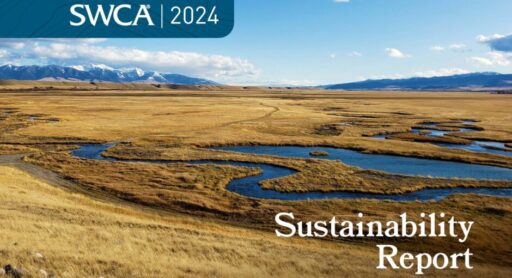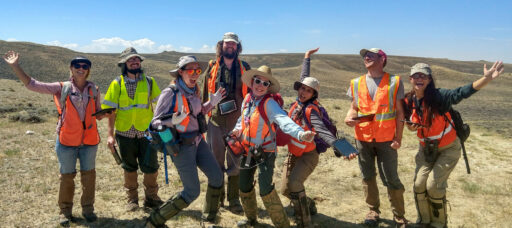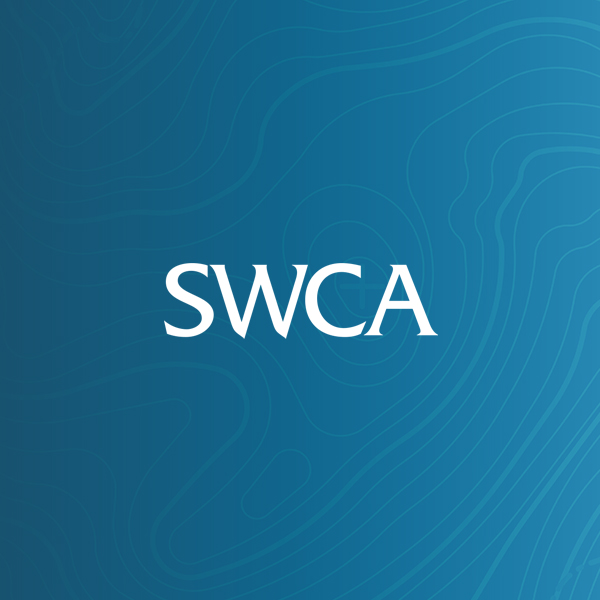2025
Comparably’s Best Company Outlook
* Providing engineering services in these locations through SWCA Environmental Consulting & Engineering, Inc., an affiliate of SWCA.

From the experts we hire, to the clients we partner with, our greatest opportunity for success lies in our ability to bring the best team together for every project.
That’s why:

At SWCA, sustainability means balancing humanity’s social, economic, and environmental needs to provide a healthy planet for future generations.

SWCA employs smart, talented, problem-solvers dedicated to our purpose of preserving natural and cultural resources for tomorrow while enabling projects that benefit people today.

At SWCA, you’re not just an employee. You’re an owner. Everyone you work with has a stake in your success, so your hard work pays off – for the clients, for the company, and for your retirement goals.
Final Rule Changes for ESA Section 10 Enhancement of Survival and Incidental Take Permits
Since joining SWCA in 2015, Nicole’s expertise in ecology, evolution, and conservation biology has led to significant contributions across nearly all service lines and ten states, cementing numerous trusted partnerships.
Nicole’s influence extends to her technical and peer-reviewed publications, with contributions to more than twenty-three scientific meetings. Notable publications include Distance Sampling Underestimates Population Densities of Dune-Dwelling Lizards in the Society for the Study of Amphibians and Reptiles Journal of Herpetology, and a study on Population Variation in Dune-Dwelling Lizards in Response to Patch Size, Patch Quality, and Oil and Gas Development published by the Southwestern Association of Naturalists, addressing impacts of patch size, quality, and oil and gas development.

Amanda Glen is SWCA’s natural resources technical director for biological services and provides strategic guidance on permitting and compliance for matters involving protected wildlife, plants, and habitats. Currently managing a national practice, she has more than 25 years of consulting experience with an emphasis on the Endangered Species Act (ESA) and how compliance with the ESA influences other regulatory programs. Her wealth of experience pertaining to endangered species issues includes research, permitting, consultations, status reviews, and conservation planning. Her experience includes negotiating compliance solutions for critically imperiled species facing potential determinations of jeopardy or adverse modification of designated critical habitats. She has led efforts to delist species no longer requiring the protections of the ESA when supported by sound science, and has been involved in voluntary conservation planning to help preclude the need to list species. Amanda frequently presents at regional and national conferences on matters related to the ESA, including new listings, regulatory and policy changes, and trends in compliance strategies.

Jessie Webber is a Senior Project Manager with over 25 years of professional experience in applied environmental science with focus on impact assessment in various regulatory contexts. Since 2001, she has worked on and/or managed over a dozen 316(b) projects at multiple facilities and have experience analyzing impingement and entrainment data, designing studies, managing modeling and cost benefit analysis, providing strategic advice and planning to clients, and meeting with agency regulators. She also has estimated impacts to aquatic life, wetlands, sediments, or other habitats in as part of a dozen Natural Resource Damage Assessments (NRDAs) for oil spills or at contaminated sites. Additional project experience includes technical support for transmission line permitting, stormwater and SPCC plans, and NPDES permit renewal permitting.

Kely Wabnitz is a biologist and principal project management team lead specializing in complex permitting issues, is an Endangered Species Act (ESA) regulatory practitioner, and has worked throughout the country, specifically the Midwest and Great Plains, for more than two decades. Kely has outstanding experience in ESA compliance and National Environmental Policy Act (NEPA) review documentation, a thorough knowledge of the biology and conservation of listed species in the Midwest, and extensive experience assisting clients with regulatory issues throughout the country. She routinely manages challenging compliance and permitting issues related to large-scale, regional, and multistate development projects. Kely has robust experience navigating related discussions, coordination, and consultations with the U.S. Fish and Wildlife Service (USFWS), specifically in Regions 2, 3, 5, and 6, and with state public siting commissions and natural resources agencies. She has worked with clients throughout the United States and has supported the successful acquisition of state and local siting permits through development of statutorily complete applications, preparation of written testimony requiring subject matter expertise, and support during public hearings.





Section 10 of the Endangered Species Act (ESA) allows the U.S. Fish and Wildlife Service and National Marine Fisheries Services (Services) to issue permits to authorize take for scientific purposes or enhancement of survival (10(a)(1)(A)), or for take that is incidental but not the purpose of an otherwise lawful activity (10(a)(1)(B)). The issuance of these permits requires conservation plans, and the Services have issued a Final Rule that changes some of the process and requirements for these permits. The Final Rule also codified previous policy guidance, making these policies binding and part of permit issuance criteria.
The changes will apply to new permit applications, new amendments, and renewals to existing permits. These changes will not apply to issued permits or sections of permits that are unchanged by a new amendment. You can read the Final Rule, which is effective as of May 13, 2024, here.
These changes clarify the expectations of the Services regarding the development and implementation of CBAs and HCPs. They may reduce confusion on the appropriate permit types necessary for applicants. Some of the changes expand the Services’ authority to determine the content of conservation plan and permit terms. This may impact an applicant’s flexibility and discretion in leading the process for these conservation plans. Costs of HCPs may increase to ensure funding assurances account for the first three elements of the now codified Five-Point Policy.
The Services are expected to provide additional guidance in an updated Habitat Conservation Planning and Incidental Take Permit Processing Handbook. The anticipated publication date is unknown.
SWCA can help you understand what the rule changes might mean for your projects. Reach out to your project manager or to one of SWCA’s regulatory specialists for more information, insights, and strategies to keep your projects on track.